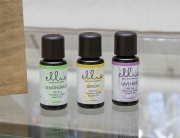How you ever wondered why you couldn’t get enough of that peppermint or grapefruit essential oil? Or why you just don’t like the aroma of another?
The “hows” and “whys” of aroma and emotion are fascinating, as aromatherapy is all about olfaction, or smell. The basic concept is that aromatic molecules are invisible to the eye, but detectable to the nose.
How do we actually smell a molecule? Well, first we need a nose, of course. Our olfactory membrane contains 10 to 20 million receptors, and is able to identify these molecules and immediately send that information to the brain. This information is received by both the limbic system and the cerebral cortex (both parts of the brain).
Scents, the Brain, and Memory
The cerebral cortex is where conscious processing, recognition, and memory take place. It assists in functions of higher learning, like learning a second language or engineering a complex building design. Our sense of smell is the only type of sensory information that reaches the cerebral cortex directly. Information from our vision, hearing, and sense of touch stops first at another region of our brain, the thalamus, before connecting with the cerebral cortex.
The limbic region, however, processes emotion, instinctive behavior, motivation, learning, and memory. For instance, if the scent of fresh sliced oranges is in the room, we may respond with, “Wow, that smells so bright and sweet!” We don’t have control over this emotional response. (Remember, this system is not under our conscious control.)
Another question: Have you ever smelled something that brought back a specific memory? For example, smelling a rose at a certain moment brought on a memory of your grandmother’s rose perfume. This is the limbic system at work, storing and retrieving memory directly connected with aroma.
Try This Fun Experiment
Try this group exercise. Gather 3-5 family members or friends. Take a bottle of any essential oil. (Geranium or Lemongrass will work great.) Open it up and pass it around. Notice the expression on each other’s face when smelling the aroma. Some may respond with a yummy “wow,” and some may find themselves with a grimace on their face. This is yet another example of how powerful our sense of smell can be and how it can create an immediate emotional response.
Find the scent your senses will love at ellia.com!
















































